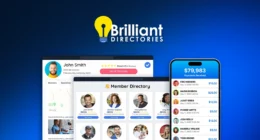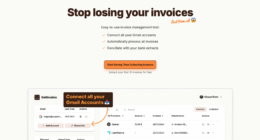Leading CRM software options for small businesses include Zoho CRM, HubSpot CRM, Salesforce, and monday CRM. These platforms offer essential features like contact management, sales automation, and marketing tools, with pricing ranging from free plans to $300+ per user monthly. Most solutions provide cloud-based accessibility, mobile apps, and AI-powered analytics. Small businesses typically see an $8.71 return for every dollar invested in CRM implementation. Understanding the complete feature sets reveals which platform best matches specific business needs.
Quick Overview
- Zoho CRM leads in customization with 40+ app integrations, while HubSpot offers a comprehensive free plan for small businesses.
- Small businesses can expect ROI of $8.71 per dollar invested in CRM solutions, making it a valuable growth investment.
- Cloud-based CRM platforms like monday CRM provide visual interfaces and workflow customization ideal for small business needs.
- Entry-level CRM pricing starts at $7 per user monthly, with free trials available to test features before committing.
- Mobile accessibility and real-time syncing across devices ensure small business teams can manage customer relationships anywhere.
The Essential Role of CRM in Small Business Growth

Nearly every successful small business today recognizes that Customer Relationship Management (CRM) software serves as a cornerstone for sustainable growth and competitive advantage.
Modern CRM systems transform how businesses interact with customers by centralizing data and automating critical processes. The implementation of scalable solutions ensures businesses can adapt and expand their CRM capabilities as they grow. Popular platforms like AI-driven analytics offered by modern CRM solutions help businesses forecast sales and optimize customer engagement.
Today’s CRM platforms revolutionize customer interactions through seamless data integration and process automation, reshaping modern business relationships.
Through extensive data management, CRM enables small businesses to track customer interactions, manage sales pipelines, and deliver personalized experiences across multiple channels.
The software’s ability to streamline operations directly impacts revenue growth through improved lead management and targeted marketing campaigns. Additionally, businesses can make informed decisions based on real-time analytics and performance metrics.
Key benefits include:
- Centralized customer information access
- Automated sales and marketing workflows
- Enhanced team collaboration
- Data-driven strategic planning
- Improved customer engagement through personalization
These features collectively drive business efficiency while fostering stronger customer relationships.
Top-Rated CRM Platforms for Small Business Operations
While selecting the right CRM platform represents an essential decision for small businesses, several top-rated solutions consistently earn high marks for their functionality and value. Each platform offers unique advantages that cater to different business needs and operational styles. Many platforms now include automated task management to help streamline operations and boost team productivity. Modern CRM solutions excel at email automation capabilities for enhanced customer engagement and personalized communications.
| Platform | Key Strengths |
|---|---|
| Zoho CRM | 40+ app integrations, highly customizable |
| HubSpot CRM | Free plan, marketing automation |
| Salesforce | Advanced analytics, AI insights |
| monday CRM | Visual interface, workflow customization |
These platforms deliver essential features like contact management, pipeline visualization, and email tracking. The modern CRM landscape also embraces emerging trends such as AI-powered analytics and social media integration. Small businesses can expect significant returns, with studies showing up to 300% increase in conversion rates and 47% higher customer retention when implementing these solutions effectively.
Comparing CRM Pricing and Value for Small Businesses

Understanding the true cost and value proposition of CRM solutions represents a critical decision point for small business owners. While entry-level options start around $7 per user monthly, extensive solutions can reach $300, making it essential to evaluate both immediate and long-term costs carefully.
Small businesses must weigh CRM costs strategically, as monthly per-user pricing spans from basic $7 plans to premium $300 solutions.
When reviewing CRM investments, businesses should consider:
- Total ownership costs, including implementation fees ($0-$5,000+), training, and data migration
- Return on investment potential, with average returns of $8.71 for every dollar invested
- Hidden expenses like third-party integrations and ongoing maintenance fees
Smart businesses can maximize value by starting with basic plans and scaling up as needed. Annual billing often provides discounts, while free trials enable thorough testing before commitment. Studies show that implementing CRM software can increase sales by 29% and boost overall business efficiency. Popular solutions like email marketing automation through platforms such as ActiveCampaign and HubSpot CRM provide robust features even in their basic plans.
The key is matching CRM capabilities to specific business needs while maintaining budget consciousness.
Key Features That Drive Small Business CRM Success
Beyond pricing considerations, the right combination of CRM features can make or break a small business’s success with their chosen platform. The most impactful features focus on streamlining daily operations and enhancing customer relationships.
Contact management serves as the foundation, offering centralized customer data storage with customizable fields and automated entry systems. AI-powered features enhance lead scoring and qualification processes, as demonstrated by leading solutions in the Indian market.
Lead management tools help businesses track deals through visual pipelines while automating follow-ups and task assignments. The system can assign leads to specific sales representatives through territory management capabilities.
Workflow automation reduces manual work by handling repetitive tasks and triggering notifications at critical moments.
Robust reporting capabilities provide insights through customizable dashboards and real-time analytics, helping businesses make data-driven decisions.
Integration capabilities guarantee the CRM works seamlessly with existing tools, while cloud-based solutions offer flexibility and scalability as the business grows.
Overcoming Common CRM Implementation Hurdles

Despite the powerful benefits of CRM systems, many small businesses encounter significant roadblocks during implementation that can derail their success. Understanding and preparing for these challenges is essential for achieving positive outcomes with CRM software.
- Data quality stands as the foundation of CRM success – businesses must audit existing records, remove duplicates, and establish clear standards for data entry to maintain system integrity. Contact management databases enable centralized storage for maintaining accurate client information and relationships.
- User adoption often falters without proper training and support – organizations should invest in hands-on training sessions and appoint CRM champions to guide team members through the change. Leveraging CRM consultancy services can provide cost-effective expertise without the burden of hiring full-time administrators.
- System integration challenges can create workflow bottlenecks – careful evaluation of compatibility with existing tools and strategic use of pre-built connectors helps guarantee smooth data flow between systems.
Strong leadership support and well-defined processes complete the framework for successful CRM implementation.
Future-Ready CRM Solutions for Small Business Scalability
As small businesses evolve in today’s digital landscape, selecting a future-ready CRM solution becomes critical for sustainable growth. Modern CRM platforms offer essential scalability features that help companies expand without disrupting existing operations. Popular platforms like HubSpot CRM provide free starter plans that allow businesses to test capabilities before committing to paid versions. Marketing automation tools enable streamlined email campaigns and lead scoring to enhance customer engagement.
Key components of future-ready CRM solutions include:
- Cloud-based architecture that grows with business needs
- AI-powered automation for streamlined workflows
- Mobile accessibility across devices with real-time syncing
- Robust security measures and data privacy compliance
- Flexible integration capabilities with third-party tools
These features empower small businesses to:
- Adapt quickly to changing market demands
- Reduce manual tasks through smart automation
- Access customer data securely from anywhere
- Scale operations efficiently while controlling costs
- Connect seamlessly with existing business systems
Organizations should prioritize CRM solutions that offer modular growth options and tiered pricing models to guarantee long-term viability.
Frequently Asked Questions
How Long Does It Take to See ROI From a CRM Investment?
Most businesses see ROI from CRM investments within 12-18 months, though some achieve positive returns in as little as 6 months.
The timeline depends on several key factors: user adoption rates, implementation quality, and system integration effectiveness. Companies that properly train employees and automate processes typically see faster returns.
On average, businesses earn $8.71 for every dollar invested in CRM, with 97% meeting or exceeding sales goals within the first year.
Can I Switch CRM Providers Without Losing My Customer Data?
Yes, businesses can switch CRM providers while preserving customer data through careful migration planning.
The key steps include backing up all existing data, using specialized migration tools, and thoroughly testing the transfer process. Most modern CRM platforms offer built-in data import features and migration support.
A well-executed migration typically takes 2-4 weeks, depending on data volume. For best results, companies should validate data accuracy post-transfer and train staff on the new system.
What Security Measures Protect Customer Information in Cloud-Based CRM Systems?
Just like a bank vault protects valuable assets, cloud-based CRM systems employ multiple layers of security to safeguard customer information.
These systems typically utilize enterprise-grade data encryption for both stored and transmitted data, strict access controls with multi-factor authentication, and regular security audits to maintain compliance.
Additionally, automated backup systems guarantee data recovery in case of emergencies.
Together, these measures create an all-encompassing shield against unauthorized access and potential data breaches.
Do CRM Systems Work Offline When Internet Connectivity Is Limited?
Yes, many modern CRM systems offer robust offline functionality.
Users can access and modify customer data, create tasks, and manage appointments without an internet connection. When working offline, changes are stored locally on the device and automatically sync once connectivity is restored.
However, some limitations exist – real-time collaboration features may be restricted, and users typically have access to a subset of data rather than the complete database.
How Often Should Small Businesses Upgrade Their CRM Software?
Small businesses should evaluate their CRM software annually, with major upgrades typically recommended every 2-3 years.
Key factors influencing upgrade timing include:
- Business growth rate and changing needs
- Performance issues with current system
- New feature requirements
- Budget availability
- Integration needs with other tools
Cloud-based CRM solutions often provide automatic updates, reducing the need for major upgrades.
However, businesses should proactively upgrade before their current system becomes obsolete or starts hindering operational efficiency.
Conclusion
The future of small business CRM software promises enhanced AI capabilities, deeper customer insights, and seamless integrations. While selecting the right platform requires careful consideration of features, budget, and scalability needs, the investment consistently proves worthwhile for growing businesses. As technology evolves and customer expectations shift, those who embrace modern CRM solutions will find themselves better equipped to nurture relationships, streamline operations, and drive sustainable growth.








